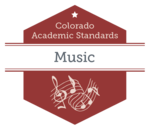You are here
2020 CAS - Music Standards Introduction
![]()

On This Page
Standards Online
Purpose of Music
“Music expresses that which cannot be said and on which it is impossible to be silent.” ~ Victor Hugo
“Music gives a soul to the universe, wings to the mind, flight to the imagination, and life to everything.” ~ Plato
By implementing a structured and standards-based music education, students continue the generational conversation and become fluent in the language of music as a manner of artistic, intellectual, and cultural expression. The acts of performing, creating, and responding to music provide a means for development and growth in the ability to express the otherwise inexpressible and to facilitate growth in many areas of academic development.
Learning to read and notate music opens for students the limitless body of musical styles, forms, and repertoire, and allows them to see what they hear and hear what they see. The interconnections in music bring together the understanding of contemporary and historical cultures as well as self-knowledge. Participation in music provides students with unique experiences and skills essential for success in the 21st-century workforce.
Music produces creativity, innovation, and cornerstone life skills that will be the key to opening doors for a more diverse and competitive workforce. In learning music, students use critical thinking, self-assessment, reasoning, problem solving, and collaboration, and make connections in new and imaginative ways as they progress through their musical education. All of these skills prepare our students for higher education and the 21st-century workforce. These standards outline the knowledge and skills needed by all Colorado citizens to participate productively in an increasingly creative economy and innovative society.
Prepared Graduates in Music
- Apply knowledge and skills through a variety of means to demonstrate musical concepts.
- Perform with appropriate technique and expressive elements to communicate ideas and emotions.
- Demonstrate practice and refinement processes to develop independent musicianship.
- Compose, improvise, and arrange sounds and musical ideas to communicate purposeful intent.
- Read, write, and analyze the elements of music through a variety of means to demonstrate musical literacy.
- Aurally identify and differentiate musical elements to interpret and respond to music.
- Evaluate and respond to music using criteria to make informed musical decisions.
- Connect musical ideas and works with societal, cultural and historical context to understand relationships and influences.
Standards in Music
The Colorado Academic Standards in music are the topical organization of the concepts and skills all Colorado students should know and be able to do throughout their preschool through twelfth-grade experience.
- Expression of Music
The expression of music is the process of practice, refinement, and performance of acquired musical knowledge and skills to communicate a range of thoughts and emotions.
- Creation of Music
The creation of music is the demonstration of learned skills in the composition, improvisation, and arranging of music.
- Theory of Music
The theory of music is the understanding of the distinctive language, conventions, mechanics, and structure of organized sound. Investigation of music theory allows for a more complete understanding of all aspects of the musical process.
- Aesthetic Valuation of Music
The aesthetic valuation of music focuses on the knowledge and perspectives needed to make informed evaluations and critiques of music. It also addresses the historical, cultural, and societal contexts which are often the beauty, heart, and soul of music.



Connect With Us





